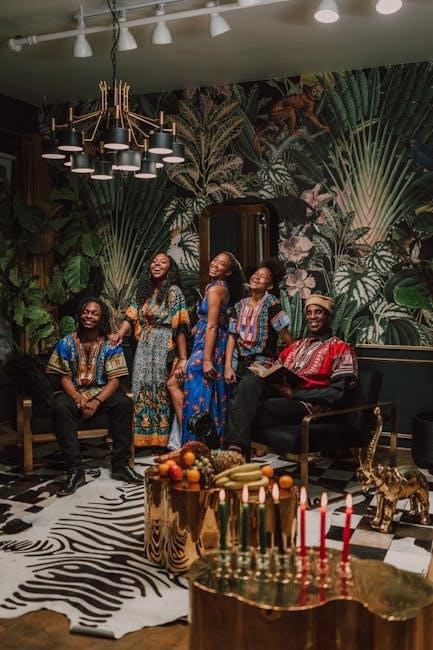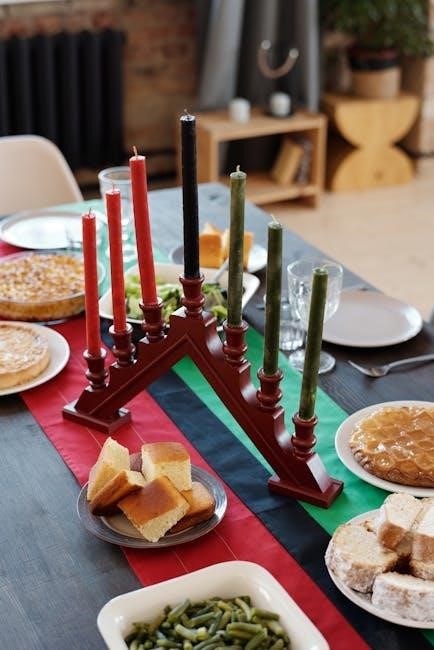Kwanzaa is a week-long celebration honoring African heritage, observed from December 26 to January 1․ It is centered around seven essential principles known as Nguzo Saba․ These principles—Unity, Self-Determination, Collective Work, Cooperative Economics, Purpose, Creativity, and Faith—guide individuals and communities toward empowerment and cultural connection․ Each day of Kwanzaa focuses on one principle, fostering reflection, unity, and collective growth․ The principles are reflected in rituals, discussions, and activities, emphasizing their relevance in daily life and societal progress․ Kwanzaa’s principles serve as a foundation for personal and communal development, promoting harmony and resilience․ The celebration is further enriched by symbols like the kinara (candleholder) and mishumaa saba (seven candles), which represent the seven principles․ Through these practices, Kwanzaa strengthens cultural identity and fosters a sense of shared purpose among its observers․ By embracing these values, individuals and communities can work together toward a brighter future, rooted in unity and mutual support․ The principles of Kwanzaa are not only celebrated during the holiday but are also applied throughout the year as guiding values for living a meaningful and purposeful life․ They encourage individuals to reflect on their roles within their families, communities, and society, promoting a spirit of collective responsibility and empowerment․ The principles are a cornerstone of Kwanzaa, providing a framework for ethical living and cultural preservation․ By understanding and applying these principles, individuals can contribute to the betterment of themselves and their communities, aligning with the core spirit of Kwanzaa․ The celebration of Kwanzaa is a time for reflection, renewal, and reaffirming the importance of these timeless principles in modern life․ Through its emphasis on unity and collective effort, Kwanzaa offers a powerful model for building stronger, more resilient communities․ The principles serve as a reminder of the importance of cultural heritage and the need to honor and celebrate the contributions of African descendants worldwide․ By embracing the Nguzo Saba, individuals can cultivate a deeper connection to their roots while striving for personal and communal growth․ Kwanzaa’s principles are a testament to the enduring strength and wisdom of African culture, providing guidance for navigating the challenges of the contemporary world․ They inspire individuals to take an active role in shaping their futures and the future of their communities, fostering a legacy of empowerment and unity․ The principles of Kwanzaa are a celebration of African heritage and a call to action for continuous improvement and collective progress․ They remind us that unity, self-determination, and creativity are essential tools for building a better world for all․ Through the principles of Kwanzaa, individuals can find a sense of purpose and belonging, contributing to a more harmonious and equitable society․ The celebration of Kwanzaa is a meaningful way to honor the past while working toward a brighter future, guided by the wisdom of the Nguzo Saba․ By incorporating these principles into daily life, individuals can embody the spirit of Kwanzaa throughout the year, fostering positive change and personal growth․ The principles of Kwanzaa are a powerful reminder of the importance of community, culture, and collective responsibility in achieving lasting progress․ They offer a framework for living a life of purpose, creativity, and faith, aligning with the values of unity and self-determination․ Through the celebration of Kwanzaa, individuals can deepen their understanding of these principles and their relevance in modern society․ The principles serve as a bridge between tradition and innovation, providing guidance for navigating the complexities of the contemporary world․ By embracing the Nguzo Saba, individuals can honor their heritage while contributing to the advancement of their communities․ Kwanzaa’s principles are a celebration of African culture and a call to action for individuals to strive for excellence and unity in all aspects of life․ They offer a timeless message of hope, resilience, and collective empowerment, inspiring individuals to work together toward a common goal․ Through the principles of Kwanzaa, individuals can find the strength and motivation to overcome challenges and build a brighter future for themselves and their communities․ The celebration of Kwanzaa is a powerful reminder of the importance of cultural heritage and the need to honor the principles that have guided generations․ By embracing the Nguzo Saba, individuals can cultivate a deeper sense of purpose and responsibility, contributing to the betterment of society․ The principles of Kwanzaa are a testament to the enduring strength and wisdom of African culture, providing guidance for individuals seeking to make a positive impact in the world․ They inspire individuals to take pride in their heritage while working toward a future filled with unity, creativity, and faith; Through the celebration of Kwanzaa, individuals can reconnect with their roots and reaffirm their commitment to the principles that have shaped their identity․ The principles of Kwanzaa are a celebration of African heritage and a call to action for individuals to strive for excellence and unity in all aspects of life․ They remind us that unity, self-determination, and creativity are essential tools for building a better world for all․ By embracing the Nguzo Saba, individuals can find a sense of purpose and belonging, contributing to a more harmonious and equitable society․ The principles of Kwanzaa are a powerful reminder of the importance of community, culture, and collective responsibility in achieving lasting progress․ They offer a framework for living a life of purpose, creativity, and faith, aligning with the values of unity and self-determination․ Through the celebration of Kwanzaa, individuals can deepen their understanding of these principles and their relevance in modern society․ The principles serve as a bridge between tradition and innovation, providing guidance for navigating the complexities of the contemporary world․ By embracing the Nguzo Saba, individuals can honor their heritage while contributing to the advancement of their communities․ Kwanzaa’s principles are a celebration of African culture and a call to action for individuals to strive for excellence and unity in all aspects of life․ They offer a timeless message of hope, resilience, and collective empowerment, inspiring individuals to work together toward a common goal․ Through the principles of Kwanzaa, individuals can find the strength and motivation to overcome challenges and build a brighter future for themselves and their communities․ The celebration of Kwanzaa is a powerful reminder of the importance of cultural heritage and the need to honor the principles that have guided generations․ By embracing the Nguzo Saba, individuals can cultivate a deeper sense of purpose and responsibility, contributing to the betterment of society․ The principles of Kwanzaa are a testament to the enduring strength and wisdom of African culture, providing guidance for individuals seeking to make a positive impact in the world․ They inspire individuals to take pride in their heritage while working toward a future filled with unity, creativity, and faith․ Through the celebration of Kwanzaa, individuals can reconnect with their roots and reaffirm their commitment to the principles that have shaped their identity․ The principles of Kwanzaa are a celebration of African heritage and a call to action for individuals to strive for excellence and unity in all aspects of life․ They remind us that unity, self-determination, and creativity are essential tools for building a better world for all․ By embracing the Nguzo Saba, individuals can find a sense of purpose and belonging, contributing to a more harmonious and equitable society․ The principles of Kwanzaa are a powerful reminder of the importance of community, culture, and collective responsibility in achieving lasting progress․ They offer a framework for living a life of purpose, creativity, and faith, aligning with the values of unity and self-determination․ Through the celebration of Kwanzaa, individuals can deepen their understanding of these principles and their relevance in modern society․ The principles serve as a bridge between tradition and innovation, providing guidance for navigating the complexities of the contemporary world․ By embracing the Nguzo Saba, individuals can honor their heritage while contributing to the advancement of their communities․ Kwanzaa’s principles are a celebration of African culture and a call to action for individuals to strive for excellence and unity in all aspects of life․ They offer a timeless message of hope, resilience, and collective empowerment, inspiring individuals to work together toward a common goal․ Through the principles of Kwanzaa, individuals can find the strength and motivation to overcome challenges and build a brighter future for themselves and their communities․ The celebration of Kwanzaa is a powerful reminder of the importance of
What is Kwanzaa?
Kwanzaa is a seven-day celebration honoring African heritage, observed from December 26 to January 1․ It emphasizes unity, cultural identity, and community empowerment through seven principles known as Nguzo Saba․ Established in 1966, Kwanzaa combines African traditions with modern values, fostering reflection, unity, and collective growth․ Each day focuses on one principle, with rituals like candle lighting and discussions․ It is a time for families and communities to connect, celebrate, and reaffirm their commitment to cultural values and shared progress․
The Seven Principles of Kwanzaa (Nguzo Saba)
The Nguzo Saba, or Seven Principles, are the core of Kwanzaa․ They include Umoja (Unity), Kujichagulia (Self-Determination), Ujima (Collective Work), Ujamaa (Cooperative Economics), Nia (Purpose), Kuumba (Creativity), and Imani (Faith)․ These principles, derived from African traditions, guide individuals and communities toward empowerment, cultural connection, and collective growth․ Each principle is reflected in rituals, discussions, and activities during Kwanzaa, emphasizing their relevance in daily life and societal progress․

Umoja (Unity)
Umoja emphasizes unity within the family, community, nation, and race, fostering togetherness and strength through shared experiences and collective efforts, reflecting the power of harmony and collaboration․
Umoja, meaning “unity” in Swahili, is the first principle of Kwanzaa․ It signifies the importance of togetherness and solidarity within families, communities, and the broader African diaspora․ Umoja encourages individuals to value collective strength and shared identity, fostering a sense of belonging and mutual support․ This principle underscores the belief that unity is the foundation for overcoming challenges and achieving common goals․ Umoja is celebrated on the first day of Kwanzaa, symbolized by the lighting of the black candle, representing African people and the unity of the race․
Practices to Strengthen Unity
Practices to strengthen Umoja include gathering with family and community for shared meals, discussions, and cultural activities․ Engaging in collective problem-solving and collaborative projects fosters a sense of togetherness․ Participating in community service and cultural events also promotes unity․ Encouraging open dialogue and active listening helps build mutual understanding and respect․ Celebrating shared heritage through traditions and rituals further reinforces the bonds of unity․ These practices help cultivate a strong, supportive community․
Significance in African Heritage
Umoja embodies the essence of African heritage by emphasizing unity and togetherness․ Rooted in African traditions, it reflects the importance of solidarity and collective action․ Unity strengthens communities, fostering resilience and cooperation․ By valuing shared identity and mutual support, Umoja honors the cultural legacy of African societies․ It serves as a foundation for overcoming challenges and achieving equality․ This principle is vital in Kwanzaa, promoting pride and empowerment through collective effort and cultural connection․

Kujichagulia (Self-Determination)
Kujichagulia, or self-determination, empowers individuals to define themselves and speak for their communities․ It fosters independence, cultural pride, and the freedom to choose one’s own destiny․

Kujichagulia, the second principle of Kwanzaa, means self-determination․ It emphasizes the freedom to define oneself and speak for one’s community․ This principle encourages individuals to embrace their cultural identity and make independent choices․
Rooted in African heritage, Kujichagulia challenges external definitions and fosters self-awareness․ It promotes the right to assert one’s values, beliefs, and aspirations, empowering individuals and communities to thrive authentically․ This principle is vital for personal and collective growth, ensuring a strong sense of identity and purpose․ It reflects the importance of autonomy and self-expression within a cultural context, aligning with the broader goals of Kwanzaa to honor and celebrate African traditions․ By embracing Kujichagulia, individuals affirm their unique contributions to their communities and the world at large․ This principle serves as a cornerstone for building resilience, pride, and self-reliance, encouraging individuals to take ownership of their lives and futures․ Through Kujichagulia, one nurtures the confidence to stand tall in their identity while fostering unity and strength within their community․ It is a powerful reminder of the importance of self-definition in navigating the complexities of modern life while staying rooted in cultural values․ By living this principle, individuals honor their heritage and pave the way for a brighter, more empowered future․ Kujichagulia is not just a concept but a way of life that celebrates independence, creativity, and the unwavering pursuit of one’s goals․ It inspires individuals to rise above limitations and embrace their full potential, ensuring that their voices are heard and their stories are told․ This principle is a testament to the enduring spirit of African descendants, who have consistently demonstrated resilience and determination in the face of adversity․ Through Kujichagulia, individuals can reclaim their narratives and shape their own destinies, contributing to the richness and diversity of their communities․ It is a principle that transcends generations, offering timeless wisdom for personal and collective empowerment․ By embracing Kujichagulia, one embraces the power to define their own path and create a legacy of strength and pride for future generations․
Practices for Self-Determination
- Set personal and collective goals to define and achieve one’s aspirations․
- Engage in activities that promote independence and self-reliance․
- Support Black-owned businesses and initiatives to foster economic empowerment․
- Participate in community projects that reflect self-determination and pride․
- Study African history and culture to deepen self-awareness and identity․
- Create art, music, or literature that expresses one’s unique voice and perspective․
These practices empower individuals to define their own paths and contribute to their community’s strength and identity․
Importance in African Culture
Kujichagulia is vital for cultural preservation and identity, empowering individuals to define their own destiny․ It fosters pride in African heritage and promotes self-reliance, resilience, and unity․ By embracing self-determination, communities can address systemic inequalities and reclaim their cultural narratives․ This principle strengthens collective progress and encourages active participation in shaping a brighter future for African descendants worldwide․ It is a cornerstone of cultural empowerment and societal transformation․

Ujima (Collective Work and Responsibility)
Ujima emphasizes collective work and responsibility, encouraging collaboration to build strong communities․ It fosters mutual support and shared accountability, essential for societal growth and collective harmony․
Definition and Meaning
Ujima, or collective work and responsibility, emphasizes the importance of collaboration and mutual support within communities․ It encourages individuals to work together to address societal challenges and achieve common goals․ This principle fosters a sense of shared accountability, ensuring that the well-being of the community is prioritized․ By embracing Ujima, individuals contribute to the collective good, strengthening social bonds and promoting harmony․ It underscores the value of teamwork and unity in building a resilient society․
Practices for Community Building
Practices for Ujima include organizing community clean-up drives, group agricultural projects, and collaborative problem-solving initiatives․ These activities foster teamwork and shared responsibility, strengthening bonds among community members․ Engaging in collective efforts promotes trust, cooperation, and a sense of accountability, ensuring the well-being of all․ By working together, individuals learn to rely on one another, creating a supportive and united community․ These practices emphasize the value of collective action in achieving common goals and improving societal conditions․

No Responses